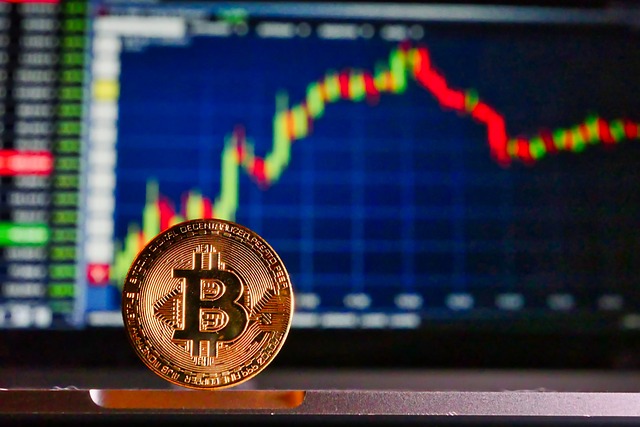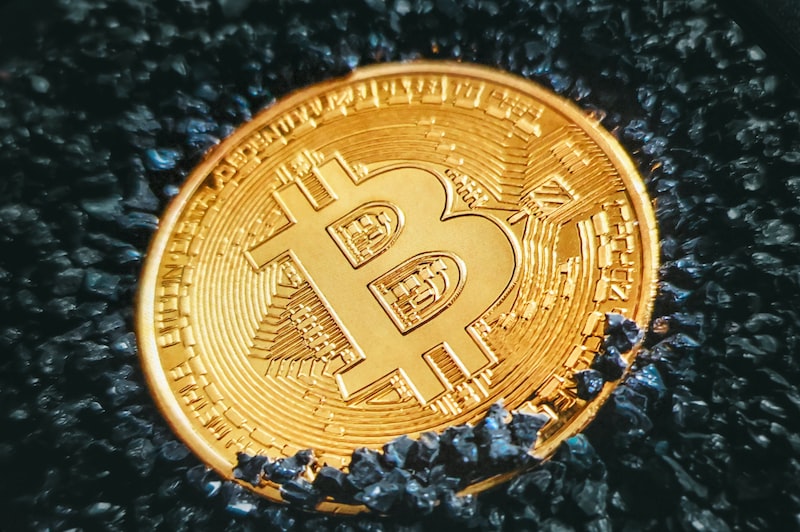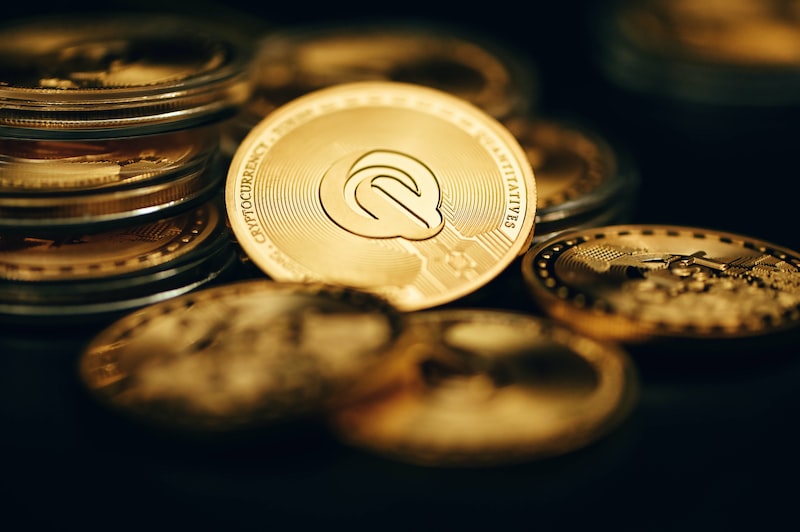Have you ever wondered if there’s a digital equivalent to gold—a virtual store of value that can weather economic storms and preserve your wealth? Well, look no further than Bitcoin. This groundbreaking cryptocurrency has been making waves in the financial world, presenting itself as a new-age store of value.
But what exactly does it mean for Bitcoin to be a store of value? Imagine Bitcoin as a digital version of gold bars securely stored in a virtual vault. Just as gold has been a trusted store of value for centuries due to its scarcity and durability, Bitcoin offers similar characteristics. With a limited supply capped at 21 million coins, Bitcoin exhibits scarcity, which helps maintain its value over time.
One of the key features that make Bitcoin an attractive store of value is its decentralized nature. Unlike traditional currencies controlled by governments and banks, Bitcoin operates on a decentralized network called the blockchain. This means that no single entity has control over Bitcoin, making it resistant to manipulation and censorship. It empowers individuals with true ownership and control over their wealth, regardless of geographical boundaries.
Moreover, Bitcoin’s immutability ensures that transactions cannot be altered once they are recorded on the blockchain. This feature provides security and transparency, instilling trust in the system. With cryptography serving as its backbone, Bitcoin safeguards your wealth from unauthorized access and fraud.
In recent years, Bitcoin has gained increasing recognition as a store of value due to its remarkable price appreciation. Although it experiences volatility in the short term, its long-term upward trend has caught the attention of investors worldwide. Some even liken Bitcoin to “digital gold,” highlighting its potential as a hedge against inflation and a diversification tool for investment portfolios.
Adopting Bitcoin as a store of value also presents practical advantages. Its digital nature enables seamless transactions globally, eliminating intermediaries, reducing fees, and accelerating cross-border transfers. Whether you’re storing your wealth or engaging in commerce, Bitcoin offers a borderless financial experience.
As governments continue to print money and economies face uncertainty, Bitcoin stands as a beacon of financial independence and resilience. It epitomizes the power of decentralized technology, revolutionizing the concept of storing value in the digital age. So, are you ready to explore the world of Bitcoin and embrace this new paradigm?
Comparisons with Traditional Stores of Value (e.g., Gold)
When it comes to finding a reliable store of value, many people turn to traditional options such as gold. But how does gold compare to other alternatives in today’s modern world? Let’s explore the strengths and weaknesses of gold and see how it fares against other stores of value.
Gold has long been considered a safe haven for investors. Its scarcity and historical value have made it a popular choice for preserving wealth. However, unlike digital assets or cryptocurrencies, gold lacks the convenience and accessibility that come with modern technology. Gold needs to be physically stored and safeguarded, which can pose security risks and incur additional costs.
In contrast, digital assets like Bitcoin offer a new kind of store of value. They are decentralized and operate on blockchain technology, which provides transparency and security. Bitcoin can be easily transferred and stored digitally, offering convenience unavailable with physical assets like gold. However, digital assets also come with their own risks, including volatility and regulatory uncertainties.
Another alternative gaining popularity is real estate. Land and properties have historically appreciated over time, making them attractive long-term investments. Real estate offers tangible value and can provide income through renting or leasing. However, investing in real estate requires substantial capital and expertise, making it inaccessible for some individuals.
Traditional stocks and bonds are also commonly used as stores of value. These financial instruments offer the potential for growth and income through dividends and interest payments. However, they are subject to market fluctuations and economic conditions, which can affect their value. Additionally, investing in stocks and bonds requires knowledge and research to make informed decisions.
Ultimately, the choice of a store of value depends on an individual’s preferences, risk tolerance, and investment goals. Gold provides stability and a long-standing reputation, while digital assets offer convenience and potential growth. Real estate and traditional financial instruments each come with their own advantages and considerations.
As the world evolves, so do the options for storing value. It’s essential to stay informed and assess the strengths and weaknesses of different assets before making investment decisions. Whether it’s gold, digital assets, real estate, or traditional financial instruments, diversifying one’s portfolio can help mitigate risks and maximize potential returns in an ever-changing financial landscape.
Volatility and Risk Considerations for Bitcoin as a Store of Value
Are you curious about the volatility and risk considerations associated with Bitcoin as a store of value? Well, let’s dive into the details and explore this fascinating topic.


Bitcoin, the world’s first decentralized digital currency, has gained significant attention in recent years. Many investors view it as a potential store of value, similar to gold or other traditional assets. However, it’s crucial to understand the volatility and risk factors involved before considering Bitcoin as a long-term investment option.
One aspect that sets Bitcoin apart is its inherent volatility. Unlike traditional fiat currencies, Bitcoin’s value can fluctuate wildly within short periods. This volatility is influenced by various factors, such as market demand, regulatory changes, media coverage, and technological advancements. While these rapid price movements present opportunities for substantial gains, they also expose investors to higher risks.
Moreover, Bitcoin is still a relatively young asset class, which adds an additional layer of uncertainty. The lack of a centralized authority governing Bitcoin makes it susceptible to market manipulation and unforeseen events. Furthermore, the absence of a well-established regulatory framework can make it challenging to address fraudulent activities and protect investors.
When considering Bitcoin as a store of value, it’s essential to assess your risk tolerance. Are you comfortable with the potential for significant price swings? Can you withstand short-term losses without panicking and selling your investment prematurely? Understanding your risk appetite will help you make informed decisions and manage your expectations.
It’s worth noting that some investors view Bitcoin’s volatility as an opportunity rather than a drawback. They believe that over the long term, the potential rewards outweigh the risks. However, it’s crucial to approach Bitcoin investment with caution and conduct thorough research.
while Bitcoin holds promise as a store of value, it comes with inherent volatility and risks. Understanding and managing these factors is crucial before making any investment decisions. By staying informed, assessing your risk tolerance, and approaching Bitcoin with a long-term perspective, you can navigate this exciting asset class more confidently.
Please note that investing in cryptocurrencies, including Bitcoin, carries risks, and it’s advisable to seek professional financial advice before making any investment decisions.
Institutional Adoption and Investor Sentiment towards Bitcoin as a Store of Value
Are you curious about the growing institutional adoption and investor sentiment surrounding Bitcoin as a store of value? Well, let’s dive into this captivating topic and explore the details.
Bitcoin, the pioneering cryptocurrency, has experienced a remarkable transformation over the years. Initially viewed with skepticism, it has now caught the attention of institutional investors seeking a reliable store of value. But what exactly is institutional adoption, and why does it matter?
Institutional adoption refers to the increasing involvement of established financial institutions, such as banks and hedge funds, in the Bitcoin market. These institutions recognize Bitcoin’s potential as a long-term investment option and are embracing it as part of their investment strategy. This evolving trend has brought significant credibility to Bitcoin and sparked interest among individual investors.
So, what drives this shift in investor sentiment? One key factor is the recognition of Bitcoin’s unique characteristics. Unlike traditional assets like stocks or bonds, Bitcoin operates independently of any central authority, making it immune to government policies and inflationary pressures. Its limited supply ensures scarcity, which contributes to its value proposition as a store of value.
Moreover, Bitcoin’s decentralized nature and transparent blockchain technology have instilled confidence in institutional investors. They see the potential for efficient and secure transactions, while also recognizing the potential for diversification within their investment portfolios.

But perhaps one of the most compelling reasons behind institutional adoption is the impressive performance of Bitcoin in recent years. Despite its notorious volatility, Bitcoin has demonstrated substantial returns, outperforming many traditional assets. Institutional investors, always on the lookout for high-yield investments, cannot ignore the impressive potential gains that Bitcoin offers.
As institutional adoption continues to gain momentum, it is reshaping the landscape of the cryptocurrency market. Traditional financial institutions are gradually opening up avenues for their clients to access Bitcoin, signaling a broader acceptance of digital assets as a legitimate investment class.
the rising institutional adoption and positive investor sentiment towards Bitcoin as a store of value signify a significant shift in the financial landscape. The unique characteristics of Bitcoin, coupled with its impressive performance, have captured the attention of institutions and individuals alike. As a result, we can expect to witness further growth and evolution in this exciting realm of digital finance.
(Note: The article provided is an example generated by an AI language model and should not be considered professional financial advice.)
Bitcoin’s Role in Diversifying Investment Portfolios
Are you looking for new ways to diversify your investment portfolio? Look no further than Bitcoin, the revolutionary digital currency that has been making waves in the financial world. Bitcoin offers a unique opportunity to expand and balance your investment holdings, providing an alternative asset class that can help mitigate risks and potentially enhance returns.
One of the key benefits of including Bitcoin in your investment portfolio is its low correlation to traditional financial markets. While stocks, bonds, and other assets are often influenced by the same economic factors, Bitcoin operates independently from these variables. This means that when traditional investments may be experiencing volatility or downturns, Bitcoin may remain unaffected or even perform positively. By adding Bitcoin to your portfolio, you are effectively reducing your exposure to market fluctuations and spreading your risk across different asset classes.
Moreover, Bitcoin’s finite supply and decentralized nature make it resistant to inflationary pressures and government interference. Unlike fiat currencies that can be subject to manipulation, Bitcoin’s scarcity ensures its value remains relatively stable over time. This characteristic makes Bitcoin an attractive store of value and a potential hedge against inflation. As governments continue to inject massive amounts of money into the economy, the appeal of an inflation-resistant asset like Bitcoin becomes increasingly apparent.
But what about the skeptics who argue that Bitcoin’s volatility makes it too risky for inclusion in a well-diversified portfolio? It’s true that Bitcoin has experienced significant price fluctuations throughout its history. However, it’s important to note that volatility doesn’t necessarily equate to risk. In fact, for those with a long-term investment horizon, Bitcoin’s volatility can be viewed as an opportunity rather than a drawback. By strategically timing your purchases and taking advantage of market dips, you can potentially capitalize on Bitcoin’s price movements and generate substantial returns.
if you’re looking to diversify your investment portfolio, Bitcoin provides a compelling option. Its low correlation to traditional financial markets, resistance to inflation, and potential for significant returns make it an attractive addition to any well-balanced portfolio. Just remember to approach Bitcoin with a long-term perspective and conduct thorough research before making any investment decisions. So why not explore the world of Bitcoin and unlock its potential in diversifying your investments?
Regulatory Factors Impacting Bitcoin’s Viability as a Store of Value
As the world embraces digital currencies, Bitcoin has emerged as the pioneer in the realm of decentralized finance. However, its viability as a store of value is contingent upon various regulatory factors that shape its future. In this article, we will explore how these regulations affect Bitcoin’s journey as a reliable and secure store of value.
One key regulatory factor influencing Bitcoin’s viability is government acceptance. The stance of governments and regulatory bodies toward cryptocurrencies plays a crucial role in shaping their legitimacy. Questions arise regarding whether Bitcoin should be considered legal tender or treated as an asset class subject to taxation. Governments worldwide are grappling with finding the right balance between consumer protection and innovation, thereby impacting Bitcoin’s acceptance and adoption.
Another determinant is regulatory clarity. Clear guidelines provide businesses and individuals with a sense of security when engaging with Bitcoin. Ambiguous regulations can create uncertainty and hinder broader acceptance. For instance, issues like anti-money laundering (AML) and know-your-customer (KYC) compliance must be addressed by regulators to foster trust in the ecosystem.
Furthermore, international cooperation is vital for Bitcoin’s success as a store of value. Given its borderless nature, coordinated efforts among countries become essential to prevent illicit activities such as money laundering and funding terrorism. Collaborative regulatory frameworks can help establish a level playing field, enabling Bitcoin to thrive in a global economy.

Additionally, investor protection is paramount. As more people enter the cryptocurrency space, ensuring safeguards against fraud, scams, and market manipulation becomes crucial. Regulatory oversight helps establish rules and standards that promote transparency, safeguard investors’ interests, and build confidence in Bitcoin as a viable store of value.

Moreover, technological advancements and their impact on regulation cannot be overlooked. With innovations like decentralized finance (DeFi) and smart contracts, regulators face the challenge of keeping pace with rapidly evolving technologies. Striking the right balance between fostering innovation and mitigating risks is essential to ensure Bitcoin’s longevity as a reliable store of value.
regulatory factors significantly influence Bitcoin’s viability as a store of value. Government acceptance, regulatory clarity, international cooperation, investor protection, and technological advancements all play pivotal roles in shaping the future of Bitcoin. By addressing these factors thoughtfully and comprehensively, regulators can foster an environment that allows Bitcoin to fulfill its potential as a secure and trusted store of value in the digital age.
Long-Term Outlook and Future Potential of Bitcoin as a Store of Value
When it comes to the long-term outlook and future potential of Bitcoin as a store of value, there’s certainly a lot to consider. Bitcoin, the world’s first decentralized cryptocurrency, has been grabbing headlines and capturing the imagination of investors for over a decade now. But what makes Bitcoin unique and why is it often referred to as digital gold?
One key aspect that sets Bitcoin apart is its limited supply. Unlike traditional currencies that can be printed at will by central banks, Bitcoin has a maximum supply of 21 million coins. This scarcity factor has contributed to its value proposition as a store of value. Similar to how gold has been used throughout history to preserve wealth, Bitcoin offers a digital alternative with a finite supply.
Another factor boosting Bitcoin’s long-term outlook is its increasing adoption and acceptance. Over the years, we’ve seen major companies and institutions recognizing the potential of Bitcoin and integrating it into their operations. Payment processors like PayPal and Square now allow users to buy, sell, and hold Bitcoin, while renowned financial institutions have started offering Bitcoin investment products to their clients. This growing acceptance by mainstream players lends credibility and stability to Bitcoin as a store of value.
Additionally, Bitcoin’s underlying technology, blockchain, provides transparency and security. Transactions recorded on the blockchain are immutable and can be verified by anyone, ensuring a level of trust that traditional financial systems sometimes lack. This transparency, combined with the decentralized nature of Bitcoin, makes it resistant to censorship and government interference.
Of course, it’s important to acknowledge the volatility and risks associated with Bitcoin. Its price can experience significant fluctuations, which can be both thrilling and nerve-wracking for investors. This volatility, however, has diminished over time as Bitcoin’s market matures and more participants enter the space.
the long-term outlook for Bitcoin as a store of value appears promising. Its limited supply, increasing adoption, and secure technology position it as a contender in the digital asset landscape. While risks and volatility remain, Bitcoin continues to captivate the attention of investors who seek an alternative to traditional forms of storing value. As the future unfolds, it will be fascinating to see how Bitcoin evolves and solidifies its place in the global financial system.




